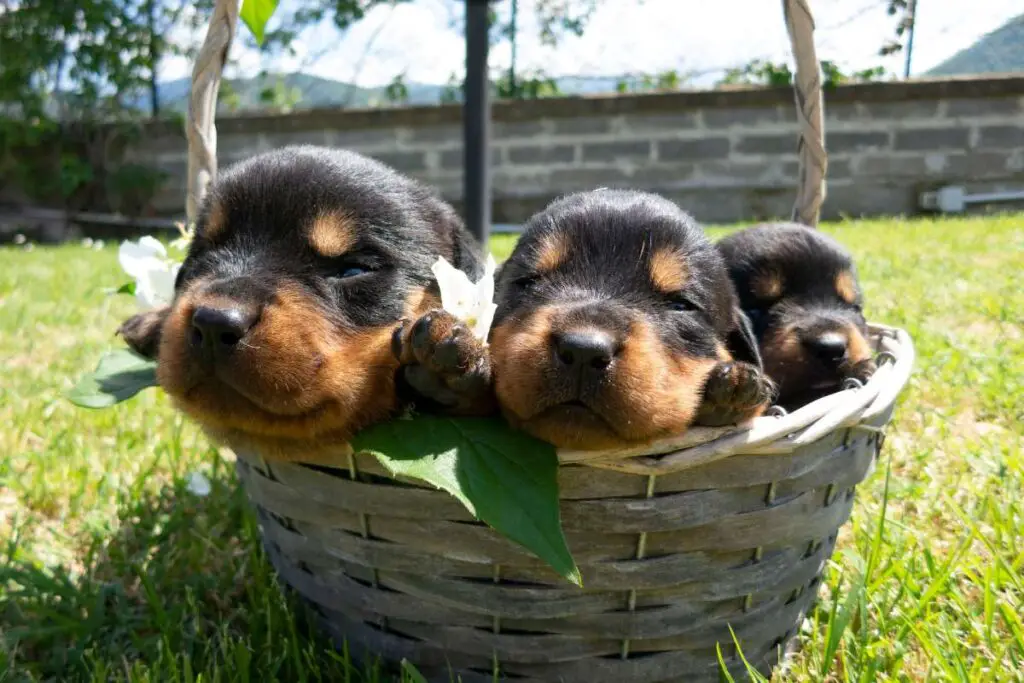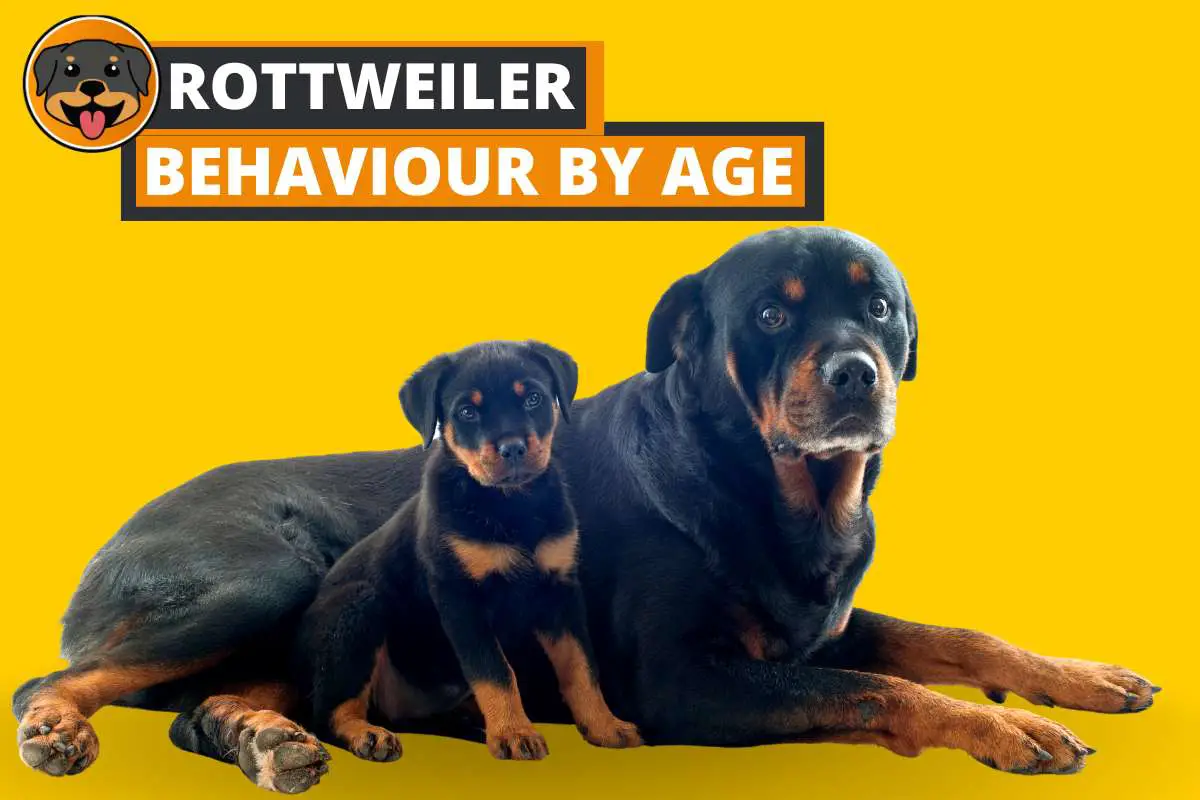Picture this: You’ve just welcomed a Rottweiler puppy into your family. The tiny bundle of joy is eagerly exploring its new surroundings, and you’re smitten. But have you ever wondered what lies ahead in your journey together?
Just like humans, Rottweilers go through various stages of growth and development, and understanding these changes is crucial for fostering a harmonious relationship.
In this blog post, we’ll look at Rottweiler’s behavior by age. We’ll learn about the changes your dog goes through as they grow and cover each stage of their life, from puppy to senior.
Rottweiler Behavior at 0-2 Weeks

At 0-2 weeks, Rottweilers are pretty much helpless little furballs. They’re born with their eyes and ears closed, so they can’t see or hear much. They rely on their mom and siblings for warmth and safety. Most of the time, they’ll be sleeping or nursing, and that’s about it.
It’s incredible how fast they grow, though! Around 10-14 days, they’ll start opening their eyes and ears, and that’s when they begin to explore their surroundings a bit. It’s such an exciting time, but remember, they’re still very young and fragile at this stage.
Just be patient, and soon enough, you’ll see your Rottweiler pup start to show more of their personality. And trust me, it’s totally worth the wait!
Rottweiler Behavior at 2-4 Weeks

At 2-4 weeks, your little Rottweiler is starting to become more aware of their environment. Now that their eyes and ears are open, they’re beginning to explore and interact with their mom, siblings, and surroundings.
It’s so cute watching them wobble around as they learn to walk! They’re still a bit clumsy, but that’s all part of the learning process.
During this time, you’ll also notice them starting to play with their littermates. They’ll be practicing all sorts of doggie behaviors like play-biting, pawing, and even some growling.
Don’t worry, though; it’s all just fun and games at this stage. They’re learning important social skills and getting a feel for how to interact with others.
These few weeks are crucial for their development, so it’s essential to ensure they have a safe, warm, and nurturing environment to grow in. And remember, it won’t be long before your little Rottweiler turns into a big, lovable goofball!
Rottweiler Behavior at 4-8 Weeks

So, between 4-8 weeks, your Rottweiler pup is becoming more active, playful, and curious about the world. They’ll be romping around with their siblings, and their little personalities will really start to shine. It’s a blast to watch them play and learn!
At this stage, they’ll also be introduced to solid food and begin weaning off their mom’s milk. It’s a big milestone, and you might see them making a bit of a mess as they figure out how to eat from a bowl.
Now is a great time to start introducing your Rottweiler pup to new experiences and people. You can begin socializing them by exposing them to various sights, sounds, and textures. This will help them become confident, well-adjusted adults later on.
One important thing to remember is that your Rottweiler pup is still very young and needs plenty of sleep and a consistent routine. Make sure to give them lots of love, care, and patience as they navigate this new stage of their life.
Trust me, this is such a fun and rewarding time for both you and your Rottweiler puppy. Enjoy every moment, and before you know it, they’ll be all grown up!
Rottweiler Behavior at 8-12 weeks

Between 8-12 weeks, your Rottweiler is entering the “puppy kindergarten” phase. They’re getting more confident, and their energy levels are soaring. They’ll be running around, playing, and exploring like there’s no tomorrow! It’s a real joy to watch them discover new things every day.
This is also the perfect time to start puppy training. You can begin teaching them basic commands like “sit,” “stay,” and “come.” Be patient and use positive reinforcement to help them learn. Remember, they’re still young, so keep training sessions short and fun!
Socialization is super important at this stage, too. Make sure your pup meets lots of different people, animals, and experiences various environments. This will help them become well-rounded and adaptable dogs as they grow up.
One thing to keep in mind is that your Rottweiler is teething during this time, so don’t be surprised if they start chewing on everything in sight! Provide them with safe chew toys to help soothe their sore gums and keep them entertained.
This stage can be both fun and challenging, but trust me, it’s totally worth it. Just remember to be patient, consistent, and loving with your Rottweiler pup, and you’ll be building an unbreakable bond for life. Enjoy the ride!
Rottweiler Behavior at 3-6 months old

At 3-6 months old, your Rottweiler is starting to look and act more like a teenager. They’re growing fast, both physically and mentally, and their energy levels are through the roof! You’ll probably notice that they’re getting stronger, more coordinated, and even a bit more independent.
This is a fantastic time to continue working on their training and socialization. Be consistent with your commands and make sure to expose your pup to new experiences and environments regularly. Trust me, it’ll pay off in the long run when you have a well-mannered and confident adult Rottweiler.
But beware – this stage can also come with some challenges! Your Rottweiler might start testing boundaries and being a bit more stubborn. It’s essential to be patient and maintain a firm but loving approach when dealing with any unwanted behaviors.
Oh, and don’t forget that your pup is still teething during this time. Be prepared for some serious chewing, and provide plenty of appropriate toys to help them through this phase.
All in all, the 3-6 month period is a rollercoaster of ups and downs, but it’s also an incredibly rewarding time. Just remember to stay patient, consistent, and understanding with your Rottweiler, and you’ll both come out on the other side stronger than ever. Enjoy this exciting stage!
Rottweiler Behavior at 6 to 12 months old

At 6-12 months old, your Rottweiler is in full-blown adolescence. Think of them as a teenager: they’re getting bigger, stronger, and more independent every day. They might even start to challenge your authority from time to time – but don’t worry, it’s all part of the growing process!
During this stage, it’s super important to stay consistent with training and boundaries. Your Rottweiler will benefit from regular training sessions to reinforce good behavior and maintain the skills they’ve learned so far. Remember, patience is key, and using positive reinforcement will make the process smoother for both of you.
Socialization is still a priority at this age, so continue to expose your pup to new people, animals, and environments. This helps them develop confidence and adaptability as they mature into adulthood.
One thing to keep in mind is that your Rottweiler might experience a growth spurt around this time. Be prepared for an increase in appetite and some potential clumsiness as they adjust to their rapidly growing body.
And finally, don’t be surprised if your Rottweiler starts showing some protective instincts around the home or with their family members. This is a natural part of their development as they become more aware of their surroundings and their role within the family.
Navigating the 6-12 month stage can be a bit of a challenge, but it’s also an amazing time to watch your Rottweiler grow and develop.
Stay patient, consistent, and loving, and you’ll both emerge from this period with an even stronger bond. Enjoy the journey!
Rottweiler Behavior at 1-2 years old

At 1-2 years old, your Rottweiler is transitioning from adolescence to adulthood. While they’re still playful and energetic, you’ll notice that they’re gradually becoming more mature and level-headed. They might even start to mellow out a bit!
This is an excellent time to continue reinforcing the training and socialization they’ve received so far. They’re likely to be more receptive to learning, so don’t hesitate to introduce new commands and skills. As always, remember to be patient and consistent – it’s the key to success with your Rottweiler!
As your Rottweiler matures, you might also notice their protective instincts becoming more pronounced. This is entirely normal, as Rottweilers are known for their loyalty and devotion to their families. Just make sure to keep an eye on their behavior and ensure they understand the difference between appropriate protection and unwarranted aggression.
During this stage, it’s essential to provide your Rottweiler with regular exercise and mental stimulation to keep them happy and healthy. They’re strong and intelligent dogs, so engaging activities like long walks, obedience training, and puzzle toys will go a long way in keeping them satisfied.
To sum it up, the 1-2 year stage is an exciting time as your Rottweiler settles into adulthood. Stay patient, consistent, and nurturing, and you’ll continue to strengthen the incredible bond you share with your furry friend.
Rottweiler Behavior at 2-5 years old

At 2-5 years old, your Rottweiler is in the prime of their life! They’re active, playful, and full of energy. You might notice them becoming more independent and less reliant on you for constant attention, but don’t worry – they still love you just as much!
This is a great time to continue training and socializing your Rottweiler. They’re likely to be at the peak of their learning ability, so you can introduce more advanced skills and commands. Just remember to keep it fun and positive!
During this stage, your Rottweiler might also start to settle into their personality. You’ll notice their unique quirks and preferences, and this is the time to celebrate them. Remember, your Rottweiler is an individual, and their personality is just as important as their breed traits.
It’s important to keep providing regular exercise and mental stimulation to keep your Rottweiler happy and healthy. They need a lot of exercise, and you might find that they enjoy long walks or even hiking with you. It’s also important to provide them with plenty of playtime and interactive toys to keep their minds sharp.
One thing to keep in mind is that Rottweilers are prone to weight gain as they age. It’s essential to monitor their diet and make sure they’re getting the proper nutrition and portion sizes.
Rottweiler Behavior at 5-10 years old

At 5-10 years old, your Rottweiler is becoming a true adult. They might start to slow down a bit and become less energetic than before, but they’re still happy and active. You might also notice that they’re becoming more attached to you, seeking out your attention and affection more often.
It’s important to keep providing regular exercise and mental stimulation to keep your Rottweiler healthy and happy. However, you might need to adjust their exercise routine to accommodate for any potential mobility issues or health concerns that may arise as they age.
One thing to keep in mind is that your Rottweiler might start to experience age-related health problems like arthritis or vision/hearing loss. It’s important to monitor them closely and take them to regular vet check-ups to catch any issues early on.
At this stage, you’ve likely established a strong bond with your Rottweiler, and they’re a valued member of your family. Enjoy spending time with them and providing them with plenty of love and care during their senior years.
The 5-10 year stage is a time to cherish your Rottweiler’s golden years. Stay attentive to their health and needs, continue providing them with exercise and mental stimulation, and enjoy their company as much as possible. They’ll always be your loyal companion, no matter what age they are!
Tips for managing Rottweiler behavior throughout their life
Consistency is key. This applies to everything from training to daily routines to socialization. Make sure you’re providing your Rottweiler with a consistent environment, and you’ll see positive results.
Socialization is also essential throughout their life. Introduce them to new people, animals, and environments regularly, and they’ll become more confident and adaptable. Plus, it’s a great way to prevent unwanted behaviors like aggression or anxiety.
Training is crucial for Rottweilers, especially during their adolescent phase. Use positive reinforcement and consistency to teach them new skills and reinforce good behavior. Don’t forget that training should be fun for both you and your pup!
Exercise is vital for your Rottweiler’s physical and mental health. They’re energetic dogs that need plenty of opportunities to run, play, and explore. Make sure to provide them with daily exercise and stimulation to keep them happy and healthy.
Diet is another crucial aspect of managing Rottweiler behavior. Make sure to feed them a balanced and nutritious diet, and monitor their weight to prevent obesity. You can also provide them with chew toys or bones to help satisfy their natural urge to chew.
Finally, don’t forget to provide your Rottweiler with plenty of love and attention throughout their life. They’re loyal, loving dogs that thrive on human interaction and affection. Spend quality time with them, and they’ll reward you with unconditional love and devotion.





